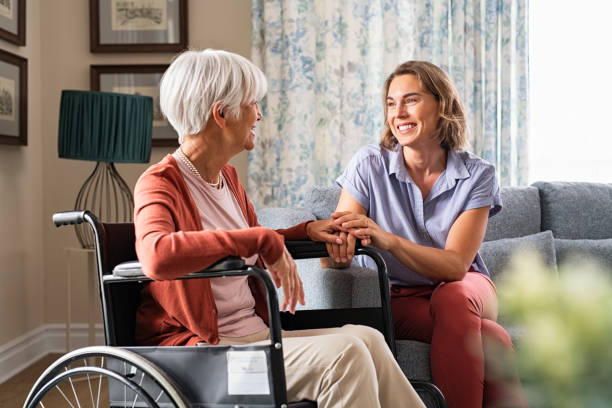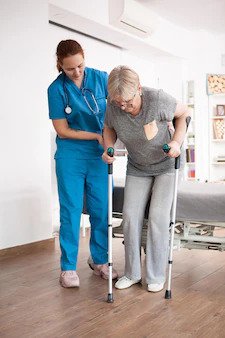The idea of a nursing home is not a pleasant one for most people. However, for some seniors, it may be the best place to receive the care they need in their final years. No matter your age, if you or a loved one is facing the challenges of aging and a decline in mobility and mental acuity, you will want to consider your options. A skilled nursing facility can offer complete care services that cannot be provided by an assisted living complex or home healthcare provider. If you or someone you know is looking at retirement communities or thinking about downsizing from their home, read on to learn more about the benefits of skilled nursing facilities so you can decide whether it’s right for you or your loved one.
It’s Highly Specialized
A dedicated, skilled nursing facility is worth considering if your loved one is facing severe medical complications and cognitive impairment. Nursing homes are equipped to handle all types of serious medical needs and can provide a level of care that families cannot provide at home. These centers employ specialized staff members, such as nurses, occupational therapists, physical therapists, and dietitians, to provide extra care and attention to residents who may need it.
This makes them well capable of detecting vital signs of severe health complications such as heart disease, kidney failure, diabetes, vision/hearing loss, etc.
So, suppose your loved one needs extensive rehabilitation, help with daily activities like bathing or eating, medication management, and specialized equipment for safety. In that case, this is the right type of facility for them.
It Provides Around-The-Clock Quality Patient Care
One of the most significant differences between skilled nursing facilities and assisted living communities is the availability of care within the nursing process. If you or your loved one requires around-the-clock care and attention, you will likely not be able to find it in an assisted living facility. Many communities need their residents to be capable of self-management at all times. For example, they may have to be able to feed themselves and get in and out of bed without assistance. Even if they offer assistance, it may only be for a few hours a day. This is not enough for someone who needs around-the-clock assistance.
With a nursing home, you can rest assured that your loved one is being well-tended to at all times of the day and night. Nursing home staff members are on-site 24/7 and are trained to handle all of a resident’s physical, social, and medical needs, making them an excellent choice for those with a severe illness.
Nursing homes also have special emergency response systems in place in case of an urgent situation. Suppose your loved one is going through a health crisis that requires more attention than the nursing interventions provided by the facility staff. In that case, you’ll be transferred to a nearby hospital for comprehensive medical diagnosis and treatment.
Caregivers Are Highly Trained for Nursing Practice
Many people who choose to use the services of a skilled nursing facility are medically fragile and require a high level of care. This means that the health care professionals at the facility must be trained to handle injuries and health conditions.
Nursing home staff members are trained in CPR and first aid and are familiar with special procedures for handling medical crisis. Nursing homes also employ therapists who can provide physical and occupational therapy to residents, even if they are in the late stages of a terminal illness. If a resident cannot walk or perform other daily activities, nursing home staff members are trained in special lifting techniques for safety.
While you may think that you can do with advice from friends and neighbors who are in the nursing profession, the reality is that you would be putting your loved one at high risk by providing unlicensed care. As such, you will want to consider a nursing facility. This way, you will know that your loved one is receiving the care they need and deserve from a registered nurse.
Medical Condition Monitoring
Health monitoring is an essential part of living in a nursing facility. If your loved one has diabetes, heart disease, or other severe conditions, they will need frequent monitoring to help reduce the risk of complications. This is important because complications can escalate quickly, making it necessary to rush your loved one to the hospital and stay there for several days. Your loved one will likely be given regular blood pressure screenings, blood sugar checks, and other tests. The nursing diagnosis can help you, and your loved one’s doctor adjust medications as needed.
Care for Dementia and Alzheimer’s Disease
A nursing home is the best option if your loved one suffers from severe dementia, such as Alzheimer’s. While some people may choose to stay in their homes as long as possible, it is best to move to a nursing home when they need more intensive care.
Dementia is a degenerative and progressive disease. It can worsen over time, making it increasingly difficult to care for yourself and your loved ones. The constant care that dementia patients need often takes a toll on the patient and the people around them. This can cause resentment and make it challenging to foster supportive relationships.
You are moving to a nursing home when necessary can take some of the pressure off your loved ones and make their lives easier. A nursing home can provide a comfortable and low-stimulation environment suited to your loved one’s physiological and safety needs.
Contact Your Choice Senior Care for the Best Personalized Care for Your Loved One
When choosing a nursing home for your loved one, you choose a facility that is highly specialized in providing high-level nursing intervention that may not be possible in a family’s home. Your loved one will receive around-the-clock care from trained professionals and have access to medical monitoring, accurate nursing diagnoses, and assistance with daily activities. With the proper care and treatment, your loved one can enjoy their golden years with the best physical and emotional health. Call Your Choice Senior Care to learn more about our elderly care services.





